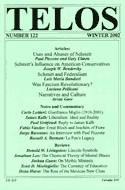Each Tuesday in the TELOSscope blog, we reach back into the archives and highlight an article whose critical insights continue to illuminate our thinking and challenge our assumptions. Today, Nicole Burgoyne looks at Donald W. Livingston’s “Lincoln Symbols,” a review of Barry Schwartz’s Abraham Lincoln and the Forge of National Memory, from Telos 122 (Winter 2002).
 In his 2002 review of Abraham Lincoln and the Forge of National Memory, Donald W. Livingston praises author Barry Schwartz for grappling with the theory of commemorative national memory and images, but then proceeds to tear the substance of Schwartz’s argument to bloody bits. The issue of “truth” proves to be Livingston’s main point of contention in this article, which not only points out the discrepancies between Lincoln myth and reality, but poses a polemical alternative to the ideals that Lincoln is meant to represent.
In his 2002 review of Abraham Lincoln and the Forge of National Memory, Donald W. Livingston praises author Barry Schwartz for grappling with the theory of commemorative national memory and images, but then proceeds to tear the substance of Schwartz’s argument to bloody bits. The issue of “truth” proves to be Livingston’s main point of contention in this article, which not only points out the discrepancies between Lincoln myth and reality, but poses a polemical alternative to the ideals that Lincoln is meant to represent.
Livingston painstakingly delineates the antebellum situation of the United States, an experiment in confederation among a collection of states predicated on the ability of any one of those states to leave the union. He airs what he calls Lincoln’s “absurd” rationale for refusing the South’s right to leave the Union.
This historical survey of the American decentralist tradition and correction of the myth of Lincoln are meant to couch a deeper unsettling of Schwartz’s take on the phenomenon of American political iconography. Not only does Livingston reject Lincoln as a symbol for all of America, but he further claims that there is no unified America. In his picture of the way things should have gone in the 1860s, the South should have seceded peacefully and continued as a separate entity much like Canada.
Livingston writes:
Throughout the book, Schwartz carries on a running battle with multiculturalists who argue that national symbols are oppressive because they drive out local and vernacular heroes. His reply is standard liberal boilerplate: Lincolnian nationalism is oppressive only in the sense of its corrosive effects on “tribalism” and the melting of separate peoples into “an increasingly free, open, and congenial society.” He seems not to have noticed that this “congenial society,” for the past 40 years or so, has been in a condition of chronic low intensity civil war.
[ . . . ] And it is just here that the constructionist theory reappears on a deeper level, and with a vengeance: Lincolnian symbols are weapons in the continuing struggle between these two Americanisms.
As this is the first mention of “multiculturalists,” it is unclear whether Livingston defines himself as part of this group. Perhaps this is the term for Livingston’s view of America as an unwilling association of centralist and decentralist cultures? In any event, Livingston’s criticisms raise a few questions on the nature of national icons.
Given how successfully Livingston has problematized the truth of Lincoln’s suitability as a national icon and his invocation of differing ideas of American political ideology, is it safe to say that no figure could adequately encompass this nation—or maybe any nation? In the political arena, a candidate may invoke a certain icon to legitimate his or her particular views. When is it necessary to identify an icon to represent America as a whole?
In terms of Livingston’s counterargument to Schwartz, as a story of two Americas, is the conflict of centralist and decentralist traditions, equated (arguably) with the North versus the South, really worth calling a “low intensity civil war” today? Where does the rest of the country fit into this view? Given how the differences of opinion between the two major political parties are so often exaggerated, how intense can today’s civil war really be?
Read the full version of Donald W. Livingston’s “Lincoln Symbols” at the TELOS Online website. If you are affiliated with an institution that is an online subscriber to Telos, you have free access to our complete online archive. If not, you can purchase 24-hour access to this and other Telos articles at the low rate of $5/article.








